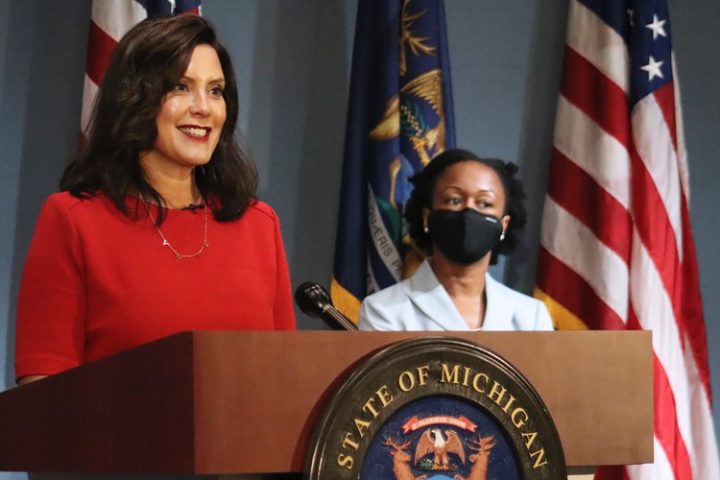
Michigan Attorney General Dana Nessel — who, like Governor Gretchen Whitmer (shown), is a Democrat — issued a press statement on October 4 saying that she will no longer use criminal prosecution to enforce the governor’s coronavirus lockdown restrictions. But she left the door open for other law-enforcement agencies to do so.
Nessel’s statement was a response to the Michigan Supreme Court’s ruling on October 2, which struck down Whitmer’s Covid orders, saying that she illegally seized authority from a 1945 law in order to extend the lockdown beyond April 30.
In its ruling, the court considered a case brought by plaintiffs who are healthcare providers prohibited from performing so-called nonessential procedures while the governor’s executive order was in effect. The U.S. District Court for the Western District of Michigan asked the Michigan Supreme Court for its opinion on a pending case, Midwest Institute of Health, PLLC v. Whitmer.
The Michigan High Court answered two questions of law posed to it by the federal court, which was reviewing the authority cited by Whitmer when she issued her executive orders. The national law firm Foley and Lardner summarized the opinion of the Michigan Court as:
1. Governor Whitmer did not have authority to issue or renew any executive orders related to the COVID-19 pandemic under the Emergency Management Act of 1976 (“EMA”) (MCL § 30.401, et seq.) after April 30, 2020 — the date through which the Legislature extended Governor Whitmer’s state-of-emergency and state-of-disaster declarations; and
2. Governor Whitmer did not possess authority to exercise emergency powers under the Emergency Powers of the Governor Act of 1945 (“EPGA”) because the EPGA unlawfully delegates legislative power to the executive branch in violation of the Michigan Constitution.
Michigan Supreme Court Justice Stephen Markman, writing for a unanimous Court, explained that the governor’s decision to re-declare renewed states of emergency and disaster every 28 days effectively nullified requirements for legislative approval stated in the Emergency Management Act of 1976 and was therefore unlawful.
Whitmer did not accept the authority of the court gracefully, responding, “Today’s Supreme Court ruling, handed down by a narrow majority of Republican justices, is deeply disappointing, and I vehemently disagree with the court’s interpretation of the Michigan Constitution.”
Whitmer noted that the ruling does not take effect for “at least 21 days” and said that her emergency declaration and orders “retain the force of the law.” She said that once that period is past, “alternative sources of authority” will enforce her rulings — thus planning to do an end run around the court’s ruling.
Even Nessel’s statement suggested that while her office will not enforce the governor’s executive orders, other state agencies may do so. She stated:
In light of the Supreme Court’s decision on Friday, the Attorney General will no longer enforce the Governor’s Executive Orders through criminal prosecution. However, her decision is not binding on other law enforcement agencies or state departments with independent enforcement authority.
Related article:
Michigan Supreme Court Slaps Down Governor’s Mandates; Whitmer Says They Will Continue Regardless



